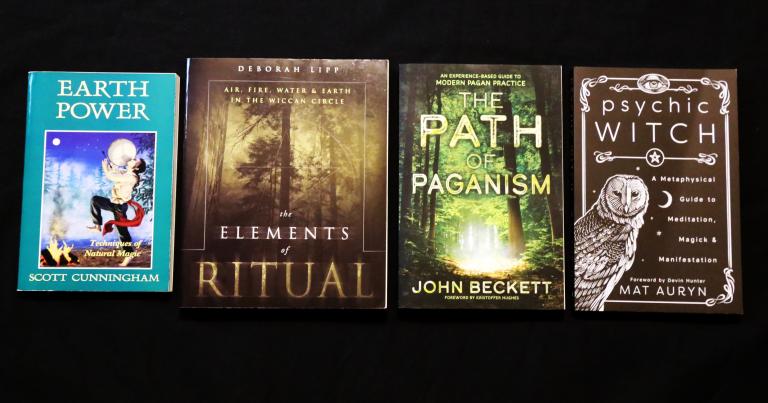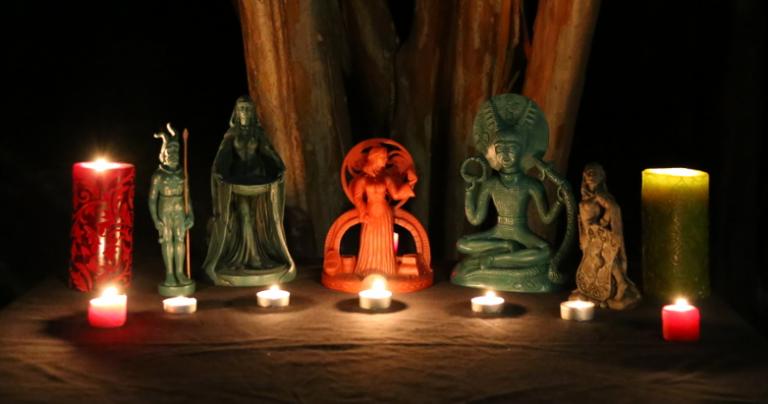This round of Conversations Under the Oaks had lots of questions about beginning spiritual practices. I’ve written about most of these topics before: there’s a chapter on spiritual practice in The Path of Paganism, and another chapter in Paganism in Depth. Still, they’re worth revisiting on the blog from time to time, if only to emphasize that while these are basic practices, they aren’t just for beginners. As we learn and grow, we don’t outgrow prayer and meditation and such – we maintain them and we build on them.
How can I develop a regular meditation practice?
The first step is to figure out what kind of meditation you want to practice. The mindfulness meditation practiced by our Buddhist friends is one way, but it’s not the only way. There’s also contemplative mediation, Nature meditation, walking meditation, and what I generically call “listening.” I covered all of these in Meditation: A Pagan Approach to a Universal Practice.
The key to a successful meditation practice is in the question: make it regular. Do it every day, ideally at the same time every day. I’ve seen meditation teachers say the best time is first thing in the morning, others that the best time is late in the evening, and still others that the best time is mid-afternoon. Different times have different advantages, but the main thing is to pick a time that works for you.
Start small. There are benefits from meditating even three minutes a day. Do what you can do, then build on it. Ideally that will be somewhere between 15 and 30 minutes a day, but that’s something you can figure out as you go. Don’t try to do too much at first – you’ll just get frustrated and quit.
Three minutes a day every day is better than 30 minutes twice a week. Find something that reminds you to stop and meditate every day. You can always set a reminder on your phone.
If you miss a day, whether from illness or forgetfulness or busyness or anything else, simply pick it back up again the next day.
If you can meditate for just a few minutes every day for three weeks, the habit will be formed and maintaining the practice will be much easier.
Could you suggest where I might learn more about land spirits and elementals?
I got started with the elements and elemental spirits with Scott Cunningham’s Earth Power – Techniques of Natural Magic (1983). It’s an extremely basic book, but it was helpful to me when I was a raw beginner. A deeper book is The Elements of Ritual: Air, Fire, Water & Earth in the Wiccan Circle by Deborah Lipp (2003). This is the best exposition of the mythology and practice of Wiccan liturgy I’ve come across. If you want something newer, Mat Auryn has a chapter on “The Elemental Forces” in his new book Psychic Witch: A Metaphysical Guide to Meditation, Magick & Manifestation (2020).
There is a ritual to call the Spirits of the Elements and the Directions in Chapter 3 of The Path of Paganism (2017).
As for land spirits, my best suggestion is to go outside where you live and introduce yourself. Practice good hospitality – bring an offering. Clean water is best, especially to start. Remember that they were there long before you – the fact that a piece of paper in the courthouse says you own the land means little to them. What matters to them is how you act. Show them you respect them and the land and they will respect you in return… eventually. Each situation is different, but this is a process that generally takes months or years, not days or weeks.
Many modern Pagans have an uneasy relationship with the land and the spirits of the land, for a wide variety of reasons. This uneasiness can keep us from building the kind of deep, reciprocal relationships we need. I addressed this in a UU Sunday Service last year titled Connecting To The Land Where You Are – that service was a condensation of a longer workshop I gave at several Pagan gatherings. It doesn’t address land spirits directly, but it does cover many of the things we need to do to prepare to meet our local land spirits.
Many times authors assume the reader is familiar with various spiritual practices and techniques. Some of these are easy to find (such as grounding and centering), but others have proven more difficult (building energy, contemplative meditation). What kind of resources can you consult when you need help with something like this?
That’s a huge challenge for authors and especially for bloggers. How do you make sure readers know everything they need to know to fully understand and participate in what you’re writing about, without becoming repetitious and boring everyone silly? That’s why I put a lot of in-line links in my posts.
All beginners need three 101-level books. That not only covers a wider range of topics than any one book, but it also brings in multiple perspectives. After you’ve read three (three good ones, that is) start moving deeper. One of the best ways to do that is to check the bibliographies of your entry level books. What sources do those authors reference?
Google can be helpful in finding more specific information, but you don’t need me to tell you that there’s a lot of crap on the internet. Being popular with search engines doesn’t necessarily mean something is accurate.
Use the search blocks on Patheos blogs. I’ve been blogging for going on 12 years – there’s a good chance I’ve written something about it. Jason Mankey has been blogging even longer. Mat Auryn does more book reviews than anyone else I know.
When all else fails, ask someone you trust. That’s one of the reasons I have these Conversations Under the Oaks from time to time.
Many polytheists suggest reading scholarly works related to the Gods you might want to follow. I’ve had trouble finding academic research via Google. Where else would you recommend I go searching for this kind of information?
This is harder to do because there isn’t good scholarly work on all the Gods, and very little from a polytheist perspective. In general, the more material we have from ancient times, the more academic work that’s been done. Thus you can find a fair amount on Egyptian or Greek deities. Not so much on Norse or Celtic ones.
Start with what you can find. If there’s a Pagan Portals book on the deity in question, that’s a good place to start. Again, check the bibliographies. If you can find a priest or other devotee of the deity, ask them for recommendations.
Aside from the Stations of The Year (the High Days) how often should one perform rituals focused on Nature and the Gods?
As often as seems right to you, or as often as They tell you to.
Seriously – there is no standard frequency. I’ve been praying to a small set of deities every night for almost ten years. I have four rounds of weekly offerings, each to a different person or set of persons. This year I’ve started regular observances of the full moons, though that more for working magic than for devotion.
None of these were part of any sort of monastic rule or overarching plan. I added each of them because they seemed right at the time, they became part of my regular practice, and so I’ve kept doing them.
As always, it’s better to do fewer things well than to do more things haphazardly. Find the frequency that works for you.
How do you balance worship among multiple deities? What does that daily worship consist of?
It helps to remember that Gods are individual persons. Balance your relations with Them the same way you balance your relations with your immediate family, your extended family, your friends and neighbors, your coworkers and professional colleagues, and such. Honor and respect each one for who and what They are as individuals.
These are the five Gods on my primary altar. I occasionally address Them as a group, but I call each One’s name in prayer each night. I make weekly offering to the Morrigan and to Cernunnos. I honor each of Them on days devoted specifically for Them, such as February 1 for Brighid and August 1 for Lugh.
I have a different but very long relationship with some of the Gods of Egypt. I almost never worship Them at the same time as my primary five. I honor Them in Their way and Their times.
Basically, worshipping and/or working with multiple deities means giving each of Them what They need and want, and never forgetting that They’re individuals.


















